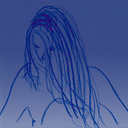Sweet dreams: Traditional Chinese Medicine inspired sleep tips and more
 Monday, November 12, 2012 at 5:09PM |
Monday, November 12, 2012 at 5:09PM |  robin ellen lucas |
robin ellen lucas |  Sleep, dream, be all that you are... (Image credit: Freya Coursey)This photo reminds me of Alice & Wonderland, or a happy dream. A vibrant, colorful walk through a forest also comes to mind... all after a restful sleep.
Sleep, dream, be all that you are... (Image credit: Freya Coursey)This photo reminds me of Alice & Wonderland, or a happy dream. A vibrant, colorful walk through a forest also comes to mind... all after a restful sleep.
Without sleep, our whole viewpoint on life changes. All that was once beautiful becomes overwhelmed by heavy eyelids, low energy, a negative mind, or a feeling that maybe tomorrow will be better. If you cover up a lack of sleep with caffeine, eventually health problems will arise—and certainly mood swings, pending disease and an unbalanced physique.
Without sleep we are not living the lives we are meant to. Don't you want the best for your health? Traditional Chinese Medicine (TCM) is a 2,000-year-old Chinese-based medical practice and theory based on herbs, acupunture, massage, exercise and diet, concerned with digestion, breathing, aging and harmony in the body. TCM has a few remedies to improve your quality of sleep that I'd like to share.
Go to sleep by 10:30 p.m.
In TCM we should retire by 10:30 p.m. because at 11:00 p.m. the qi—CHē | (also chi or ki ), the circulating life force whose existence and properties are the basis of Chinese philosophy and medicine—in the liver regenerates itself. In other words, the air or breath of our emotions are controlled by the liver. We need to let them do their work so that we can be at peace for our slumber.
Drink room temperature water
Cold water may taste refreshing but drinking it causes your body to work harder to heat it up. If your body is over-stimulated before going to bed, you will most likely remain awake for awhile.
Walk around barefoot
Let you toes spread out and grasp the tile or wood floor; let them sink into the carpet and feel the fibers. This balances the energy in your body, helps to clear your mind and enables you to naturally connect with yourself.
Get acupuncture
In China, the first choice for a sleep remedy is acupuncture, an alternative medicine that is based on the manipulation of thin needles that are inserted into points on the skin along the meridians—the idea being to stimulate the meridian system to bring about relief by rebalancing yin, yang and qi.
Have foot massages
Of course, it feels best to be given a foot massage by a loved one (than to give yourself one). This allows you to relax into the tension your feet carry all day long. Your feet have a strong connection with your mind's meridian pathways, which when open, help you become more relaxed.
Drink chrysanthemum tea
Chrysanthemum tea has been known by TCM to treat insomnia since the 15th century. It is recommended to drink this flowering herb daily to maintain waking and sleep cycles.
Make it dark enough
In the room where you sleep, it should be dark enough so that you are not able to see your body. Try to cover up bright lights in your bedroom—even dull ones that emanate from electronics. And, by all means, no "screen time" in your bed in the darkness.
Intake valerian tincture
Valerian root is a great aid for sleep and relaxation. It's used in the U.S. for insomnia and nervous tension. The dried roots are usually prepared into a tea, capsules or tincture. The tincture is my favorite in a glass of water, felt immediately.
Red wine
If you enjoy wine, a glass of red wine will relax you while giving you the added benefit of infusing your system with antioxidants, a healthier veins, provoking thought and even better eyesight. Sip, de-stress and dream.
Meditate
Save the most important for last (right before sleeping). It is vital that your mind is clear before turning in for the night. Meditation's effect to calming the mind richochets to the body and to all that you are. Our breath lives in the moment, and focusing on only that—for as long as it takes (5 minutes, 1 hour, etc.)—leaves us with a clear space. It is here that we invite the creative process, right before zzzzzzzzz...
© 2012 R.E.L. Copywriting







Reader Comments (1)
Thank you for your comment. Glad you enjoyed. Come back again soon.... -robin